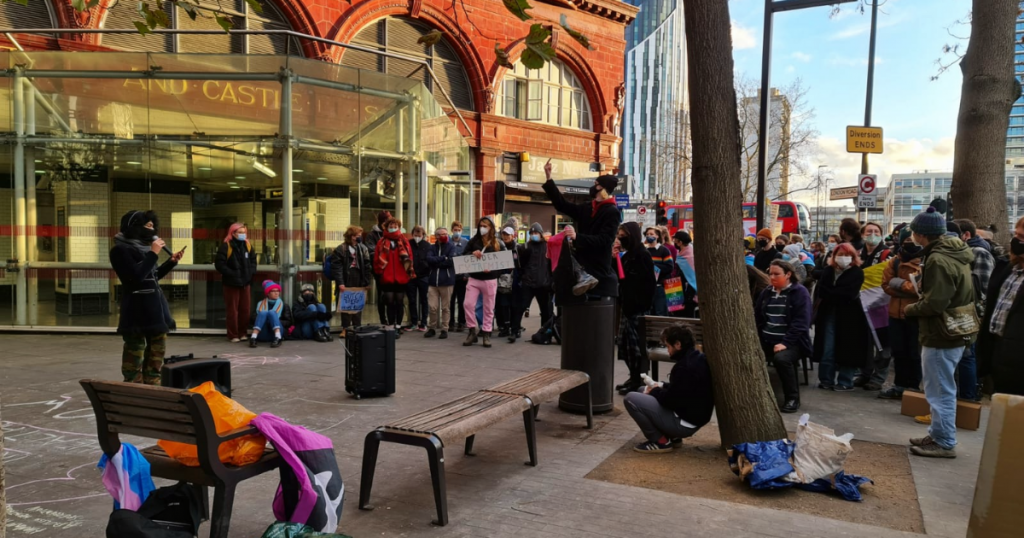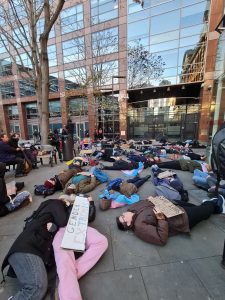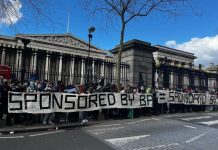rs21’s Charlotte Powell reports on a demonstration outside NHS England and explains why it is a hugely important moment in the struggle for trans liberation in Britain.

On Saturday 4 December, around 150 protesters gathered outside NHS England headquarters in London to demand healthcare justice for trans and nonbinary people in Britain.
The protest was called by Transgender Action Block, with a focus on five demands for changes in NHS practice. This is the first time in years that trans people have been protesting on the streets with a specific target of NHS England, demanding that the NHS bosses change their policy on healthcare for trans people.
The crowd was mostly trans, with a mixture of ages present, and very energised and angry.
The women and gender non-confirming people’s caucus of the United Tech and Allied Workers union (UTAW) were present.
We chanted ‘waiting lists kill’, ‘informed consent now’, and ‘abolish GICs’. Protesters interacted with passers-by from Elephant & Castle tube station and the bus stops next to NHS England, and many stopped to listen to speeches and chanting.
The demands set out by Transgender Action Block are:
- An informed consent model of care
- Abolition of the segregated Gender Identity Clinics
- No more segregated pilot schemes
- Resume prescription of puberty blockers to trans youth
- Equity of treatment in all aspects of healthcare
Why trans people want to abolish the Gender Identity Clinics (GICs)
Jack Doyle, a healthcare advocate for trans and nonbinary people, gave a speech outlining the problems of the current system:
‘Based on how fast GICs are currently getting through their waiting lists, projections say that someone referred now will be seen for a first appointment in 27 years. As someone who helps people navigate and get around the GIC system, I am aware that for many people this is a death sentence.’
‘The first thing we have to do is acknowledge that there’s another way – our comrades in many other countries fought to break free of the gender clinic system in the 80s and 90s and move towards an informed consent model. The idea that trans people deserve bodily autonomy and can make informed choices about our bodies isn’t a utopian future – right now there’s someone in New York City who decided to start hormones last week and is picking up their prescription today.’
‘The second thing to realise is that we are really fucking good at looking after each other. We already operate a healthcare system outside of the NHS – probably most trans people in the UK have done some kind of self medicating. We help each other source hormones when there’s no way for us to get them prescribed, we learn how to read our blood tests better than most GPs, we share stories to build up resilience for gender clinicians’ patronising dehumanising questions, we come over to make dinner and stay up late with our suicidal friend so they don’t have to spend 14 hours on an A&E chair.’
‘It’s this kind of solidarity that will win this. Start by organising your friends and community. I’ve been doing this for a long time, and this is the first time in a while I’ve felt real hope about this movement. I believe we will not die waiting – I believe that we will win.’
Abigail Thorn, well known for her YouTube channel philosophytube, gave an impassioned speech highlighting that the NHS is guilty of criminal neglect: The NHS constitution sets out that patients have a right to be seen within 18 weeks of referral for a service, but trans people wait for around five years at current averages. She described how trans people are literally segregated in healthcare – forced to obtain letters from psychiatrists in order to access treatments that are available to cisgender patients as a matter of course. Her points were met with huge cheers from the crowd throughout, and she ended with two words that have been said far too little in our movement. Not ‘trans rights’, but ‘trans power.’ It was as though she had unlocked something – with zero hesitation the hundred or so of us gathered around raised our fists in the air and shouted it along with her at the top of our voices.
Chay Brown, healthcare director of TransActual, spoke about the six hundred or more transmasculine people in physical limbo, some in daily pain, due to the NHS suspension of phalloplasty and metoidioplasty. This suspension was made in secret, and patients who were literally in between stages 1 and 2 or stages 2 and 3 of surgeries which are meant to happen over a matter of months were not told for over a year that the surgeries might now not happen for three or four years.
Trans struggle is class struggle – it is a struggle for life
One of the Transgender Action Block organisers gave a speech focusing on the class nature of medical transphobia. She described how the state demands that everyone, including cis people, operate within strictly binary categories of gender. Navigating the expensive and gatekept legal requirements of transition is labyrinthine for trans people who identify as women or men, impossible for those who identify as nonbinary. Meanwhile, accessing timely healthcare is only an option for the mostly white and middle-class trans people who are able to go through private clinics. The forces that condition trans peoples’ lives and entrap us are the same forces that maintain class oppression and capitalism.
After the speeches, protesters held a die-in on the pavement to symbolise the many who have died while on NHS waiting lists. During this, another Transgender Action Block gave a speech outlining the key injustices we were protesting and speaking against private healthcare and the fact that companies are allowed to profit off the gatekeeping and defunding of NHS services. 
The protest rounded off with a vigil. We lit candles for our fallen siblings who have died while excluded from medical care. The protest named these deaths for what they are – social murder.
Why this protest was important
Despite the fact that we face disproportionate violence in public, trans people are not afraid to take to the streets in protest. In recent years, however, trans marches have mainly either been pride marches or counter-protests against transphobia. The organisers of Transgender Action Block have taken bold initiative and invited the trans community to go on the attack.
As mentioned above, this is the first time in years that trans people have come out swinging at the gatekeepers of our healthcare, with clearly stated demands. There are many workers in the NHS who are sympathetic with these demands, some who are even fighting for them within the system. But the bosses of NHS England and the tories in parliament aren’t going to change a thing without a sustained movement of trans people for healthcare justice.
We’ve been sounding the alarm for years. But today was important because it focused our community’s anger on one of the institutions most able to redress the injustices that are done to us. Our demands for healthcare justice are winnable. If we continue to organise we will win them, and much more, in the coming years.

Below is the text of a flyer that Transgender Action Block produced for attendees and passers-by of the demonstration.
Our bodies, our choice!
The NHS is segregated. Transgender people are forced to attend separate clinics and be grilled by psychiatrists to access basic treatment that cisgnder people get from their GPs, like hormone replacement therapy and referral for surgeries. Combined with austerity and underfunding this creates a bottleneck resulting in decades-long waiting lists. This is a routine and overt breaking of the law on maximum waiting times.
Other countries, like the US and Canada, don’t do things this way. Despite evidence that informed consent works, the GMC, the BMA, and the Royal College of GPs refuse to desegregate primary care and treat us equally. Their proposed ‘solutions’ – opening more segregated clinics – continue to deny our bodily autonomy, rely on a postcode lottery, and are vulnerable to funding cuts. Informed Consent, free of reliance on a dysphoria diagnosis, is the only way to clear the waiting lists.
On top of this all, doctors still blame our unrelated health issues on our gender identities. They still refuse to prescribe us care and deeply mistreat us in our regular health appointments. We have tried writing letters, lodging complaints, joining their committees, and bringing lawsuits. We are still dying because the NHS refuse to listen.
Now we are here to make them listen.
The role of doctors should be to tell us the risks and explain the options, as they do with cis patients, not gatekeep our care until we perform outdated narratives for them. We deserve the right to change our bodies in the ways we want and need to. We demand care which respects our lived experience, delivered in a timely manner.

















[…] A huge step forward for trans protest in Britain. Charlotte Powell December the 4th. […]
[…] for “not trans rights, but trans power!” which was loudly echoed by those present, according to rs21 […]
[…] for “not trans rights, but trans power!” which was loudly echoed by those present, according to rs21 […]
[…] for “not trans rights, but trans power!” which was loudly echoed by those present, according to rs21 […]
[…] for “not trans rights, but trans power!” which was loudly echoed by those present, according to rs21 […]
[…] trans rights, but trans power!” which was loudly echoed by those present, according to rs21 […]
[…] for “not trans rights, but trans power!” which was loudly echoed by those present, according to rs21 […]
Very well written and truly informative. I do find it a bit hard to swallow when you refer to “the NHS” as this could be implied that it’s a protest against the NHS as a whole. The “NHS” referred to is actually the policies and management of the NHS that set the 2 tiered system of healthcare. Having spent the best part of the last 2 ½ months being cared for in an NHS hospital for pancreatitis.
Thanks for your comment, Andrea. I totally understand that, and had hesitations myself about it when writing it, so I’m glad you have raised this.
I’ll try to keep this brief, but I have a lot of thoughts on it, so here goes:
Many of my friends and comrades are NHS workers and I care deeply about defending universal free healthcare against tory cuts. I did try to specify in the article that the NHS bosses are mostly to blame. But unfortunately it is not just the bosses and the GICs: there is also a widespread problem of GPs refusing to give bridging prescriptions and other treatment, which I allude to in the article. There are also a number of local Clinical Co-ordinating Groups with very transphobic policies about providing funding for trans healthcare, even after a diagnosis is obtained. Add to that the fact that many of us (myself included) experience direct transphobia from NHS workers at some point or other, and you end up with a lot of grievances which are dispersed much more widely than at the NHS bosses alone.
I strongly believe that these problems all have their roots in bad policy from the top of the NHS, tory cuts, and broader social oppression in the patriarchal capitalist society we live in, but these roots penetrate deeply throughout most of the NHS. A lot of trans people struggle to access basic NHS services totally unrelated to gender because of widespread ignorance and bureaucratic issues, and when they do they often get misgendered (and worse) during the course of that treatment.
I think we have to fight to defend the NHS, and I want trans people to be a part of that fight. But also we have to recognise its problems. I think the movement to defend the NHS and the movement for trans liberation are alike in that they both need all the help they can get, and I believe if we work together we can not only defend the NHS from further cuts but eventually transform it into something so much better for workers and patients alike.